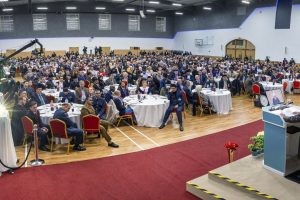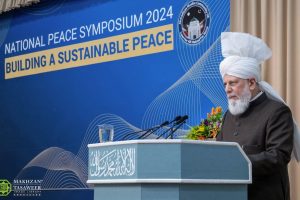
© Shutterstock
It is estimated that around eight billion Christmas cards are sent annually in the UK alone, each containing a heart-warming message of peace and happiness for the season and upcoming New Year. Yet as 2023 draws to a close, these ideals seem more distant than ever.
In an age of round the clock news, we are bombarded with negativity and have almost become desensitised to headlines about war, abuse, climate crisis, terror, racism, and more. All too often we are reminded of the things that create disunity, distrust and despair. When the future appears so bleak, it is very easy to give up hope.
Islam, however, teaches us a very optimistic view of human nature. The Prophet Muhammad (sa) once said, “For every disease, Allah has created a cure.” No matter how hard things might seem, better times lie ahead. Solutions can be found for every problem. There is always light at the end of the tunnel.
This optimism comes with a qualification – an honest appraisal of where we are now, and the steps needed to reach the point we wish to be.
Using terms such as tafakkur (contemplation), tadhakkur (remembering) and tadabbur (deliberation), more than 750 verses of the Holy Qur’an speak about the need for humans to study, use reason and reflect. These range from about the creation of the universe and natural world, to historical events and diversity in society.
Particularly pertinent at this time of year is the command to ponder our individual progress – intellectually, morally and spiritually.
“O ye who believe! fear Allah; and let every soul look to what it sends forth for the morrow. And fear Allah; verily Allah is Well-Aware of what you do.” (Surah Al Hashr 59: 19)
The supreme head of the Ahmadiyya Muslim Community, Hazrat Mirza Masroor Ahmad, frequently speaks about introspection with the simple but profound Urdu words “apna jayza len” (“assess yourself”). In his Friday Sermon of 30th December 2016, His Holiness posed a series of questions for people to ask themselves at the end of each year, from assessing their standard of honesty and humility, to how much they have loved and served others. The questions include:
Have we tried to attain the highest standards in good morals?
Have we been trying to provide benefit to mankind by utilising all our faculties?
Are we trying to excel in showing sympathy to the creation of Allah the Almighty?
Have we protected ourselves from committing any kind of injustice?
Similar reflections have been echoed by other world leaders, such as Pope Francis, King Charles III and Archbishop Justin Welby, in their recent Christmas messages. They are a useful reminder and checklist for anyone wanting to take a good look in the mirror as they make their New Year’s Resolutions, and for thinking about how to be a better version of themselves as well as being of benefit to others.
No single individual can transform the whole of humanity, but we can influence change locally. Harmony in the world is not possible unless we first attain contentment within ourselves and in small places – in our hearts, our homes, and our communities. If this mindset was to be universalised, it would inevitably lead to bigger change.
“Surely, Allah changes not the condition of a people until they change what is in their hearts.” (Surah Al Ra’ad 13: 12)
In James Norbury’s popular Big Panda and Tiny Dragon, as the two characters journey through the seasons and encounter challenging weather in Winter, Tiny Dragon asks ‘How do you keep going?’ ‘Sometimes,’ replied Big Panda, ‘even the smallest step is better than no step.’
Resolving to reform something about ourselves may just offer a glimmer of hope, but that is better than none at all. Far from being a pipedream and mere words in a seasonal greeting card, peace and happiness are much closer than we might imagine.
“Surely every succeeding hour is better for thee than the preceding one.” (Surah Al Duha 93: 5)
About the author: Waqar Ahmad Ahmedi is Head of Religious Studies at a secondary school in Godalming, Surrey. He also serves on the Editorial Board of The Review of Religions.




Add Comment